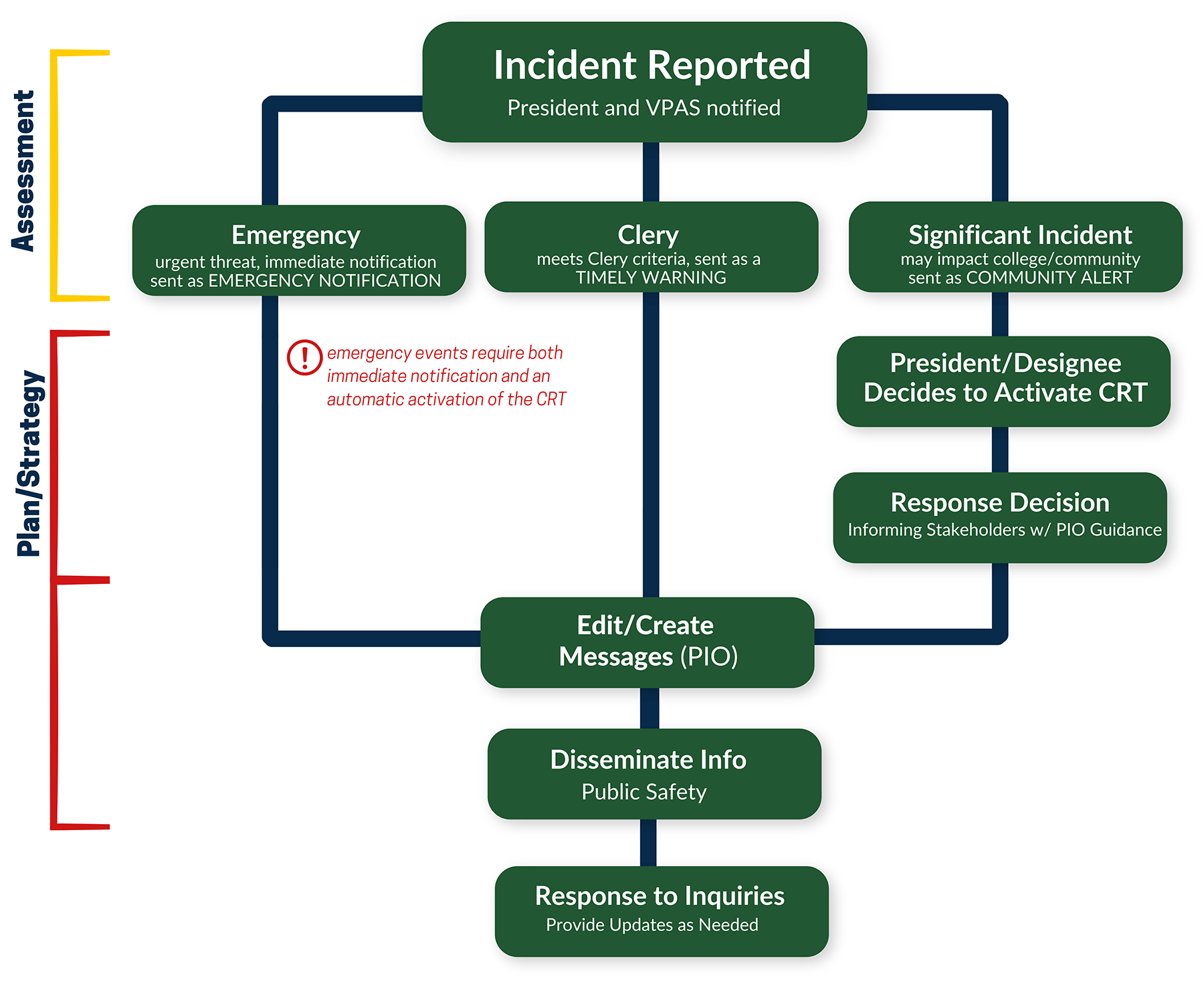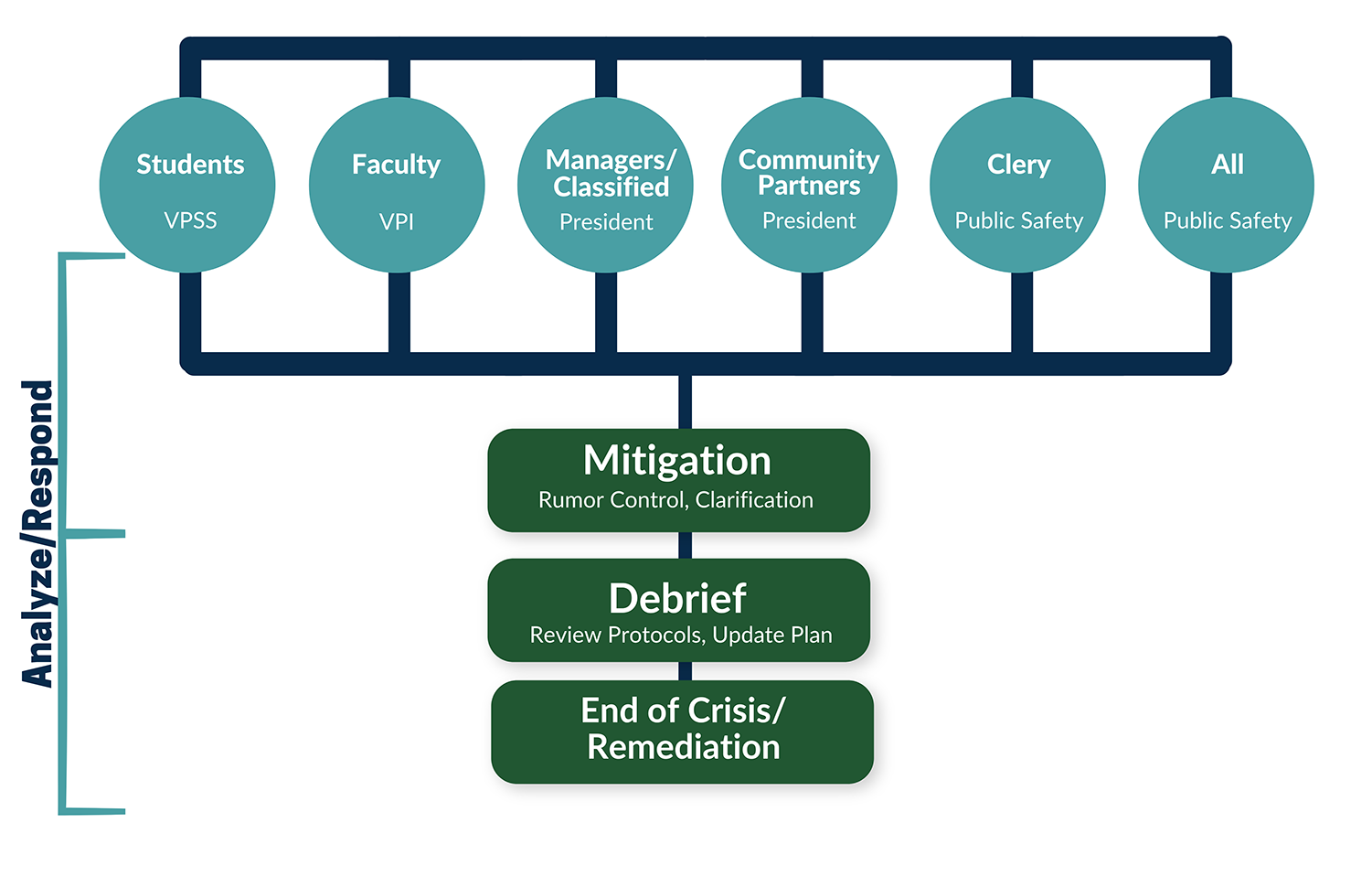A crisis is an event that either causes harm or the potential for harm to an individual or organization. Crises can be brought about by an emergency. Some examples of an emergency include: a natural disaster, power outage, active shooter, cyber attack, etc.
In an emergency or crisis, timely and factual communication can help to protect life and property at Golden West College. This Plan outlines how GWC will communicate with its stakeholders and the public in the event of a crisis or emergency situation.
The Plan includes procedures for how the College’s Crisis Response Team (CRT) identifies and assesses potential emergencies and significant incidents that may impact GWC or its community. The Plan also identifies the roles and responsibilities of each member of theCRT. The Plan is meant to supplement GWC’s Emergency Operations Plan, which is developed by the College’s Public Safety Department in coordination with the Coast District’s Emergency Operations team.
Due to the unpredictable and rapidly changing nature of some emergencies, this plan must be flexible. The CRT reserves the right to decide to modify this plan in response to a dynamically unfolding incident or crisis.
…
Goals of GWC's Crisis Communications Plan: To ensure the safety of Golden West College’s campus and local community by providing accurate and timely information during an emergency or crisis.
Objectives of GWC Crisis Communications Plan
What does this Plan do?
The Golden West College Crisis Communications Plan serves as the blueprint for the coordination of communications with both internal and external audiences in the event of an emergency or any other critical incident.
Who is part of the team?
Crisis Communications at GWC will be led by the College’s Crisis Response Team (CRT), which includes the College’s Executive Leadership team, as well as key stakeholders who have a role in responding to and managing emergencies on campus such as the Public Safety Director, Human Resources Director and Public Information Officer.
Crisis Response Team Membership
As Needed
During an emergency on campus, several media platforms will be utilized to inform the campus community of timely and relevant information in order to protect the safety and well-being of students, employees and community partners. The primary and most immediate mode of communication will be Rave Alert, the College’s text/email notification system. The CRT will follow the posting schedule below, in order of first to last.
There are three types of notifications that the CRT will send out, depending on the nature of the incident.
Types of Notifications
COMMUNITY ALERT: Following the guidelines established in this plan, a Community Alert is sent via Rave Alert via email, to inform students, employees and community partners of an incident that has occurred but which is not an immediate threat.
TIMELY WARNING: Following the guidelines established in this plan, a Timely Warning is sent via Rave Alert typically via email to inform students of certain criminal offenses occurring in GWC’s Clery geography. Timely Warnings may include: type of crime, date, time, location of the incident, and suspect information, when applicable. Please consult the full list of Clery Act crimes or this document's Addendum I for more information.
During an emergency or crisis, every member of the CRT will have a role. Members of the CRT also are responsible for notifying their secondary and tertiary backups if they will be off campus and unavailable to fulfill their role in the event of an emergency.
| PRIMARY | SECONDARY | TERTIARY | |
| Rave Alert | Public Safety | College PIO | District PIO |
| Social Media | College PIO | Marketing & PR Office | District PIO Office |
| Mobile App | VPSS | VPI | College PIO |
| Website | Marketing & PR Office | College PIO | IT Department |
| PRIMARY | SECONDARY | TERTIARY | |
| Rave Alert | College PIO | Public Safety | VPAS |
Anyone – including faculty, students, classified staff, managers, and members of the community – who becomes aware of a potential crisis or emergency that may potentially pose a threat to the College is responsible for notifying key officials of the incident or event.
When reporting an incident, be prepared to answer the following questions:
For Emergencies/Immediate Threats to Campus or Personal Safety
First and foremost: In an emergency dial 911. From desk phones, the Huntington Beach Police Department receives the call, and GWC Public Safety office receives a notification of the 911 call, as well as the extension being used. From a mobile device, 911 calls made on campus will route to HBPD, and GWC Public Safety does not receive a notification.
The primary means of communicating a threat or potential threat to campus is the GWC Public Safety Office. Public Safety officers are onsite and available to respond 24 hours a day. In addition to blue emergency phones located throughout campus, all on-campus telephones are outfitted with a button that says “GWC Emergency Line.” Additionally, the GWC campus community is encouraged to save the Public Safety phone number listed below to their mobile devices.
GWC Public Safety 24-hour phone line - (714) 895-8924.
For Non-Emergencies/Non-Immediate Threats to Campus
In some cases, in which there is a non-immediate potential threat to campus, it may be appropriate to report an incident via another avenue. These include GWC’s Assessment and Care Team (ACT), the College’s Human Resources and Executive offices, and reporting incidents to your direct supervisor.
Below are the additional means for reporting incidents that do not pose an immediate and urgent threat to campus.
Assessment and Care Team (ACT)
Human Resources
GWC Executive Team
GWC Managers
Note: If you aren't sure about reporting an incident, please error on the side of safety and report what you know
If you see something, say something!


Note: Calls from the press can be directed or routed to the Golden West College Public Information Officer.
GWC's College PIO can be reached at gwcnews@gwc.cccd.edu
How often will the plan be updated?
This Plan will be updated annually AND after each activation of the CRT if an obvious improvement is identified during the course of an unfolding incident or emergency. The President of the College is responsible for coordinating the process to update the Crisis Communications Plan.
| Date | Changes Made |
| Aug 16, 2023 | Updated flowchart, added Addendum I: Clery Act, clarified language for notices / alerts, removed Ring Central from list of notification systems |
| April 12, 2024 | Updated name of emergency alert system (changed from Regroup to Rave Alert), Updated types of notifications: changed from 2 types (Alerts and Notices) to 3 types (Emergency Notifications, Timely Warnings and Community Alerts) to more closely align with Clery guidelines. Changed Behavior Assessment Team (BAT) name to Assessment and Care Team (ACT) to reflect recent name change at the College. |
The Jeanne Clery Disclosure of Campus Security Policy and Campus Crime Statistics Act, or Clery Act, requires that colleges and universities notify the public of certain crimes which occur within campus and campus-owned properties. These reports are called timely warnings.
How do we make the decision to send a Clery Alert?
Golden West College must file incident reports when it meets the following requirements:
Annual Security Report
Each fall, GWC produces and disseminates a public annual security report (ASR) to employees and students, as well as to the general public on the College's website . This ASR must include statistics of campus crime for the preceding three calendar years. View Golden West College's Annual Security Reports here.
Clery Crimes
The Clery Act requires that GWC file crimes according to federal standards, terms and definitions. At times, crime titles may not correlate with California state standards. View a complete list of Clery crimes.
Criminal Offenses:
Hate Crimes (in addition to any criminal offense):
Violence Against Women Act (VAWA) Offenses:
Arrests and Referrals for Disciplinary Action:
